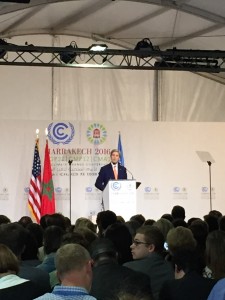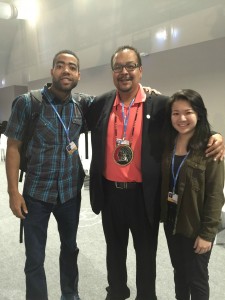In spite of a presidential election result that endangers their efforts, the Obama administration is continuing to push hard on climate efforts at COP22. On Wednesday, this push came to a climax with the appearance of Secretary of State John Kerry. While I stood in a tightly-packed tent to hear him speak, I realized that Kerry’s speech seemed to be a direct address at Trump, persuading him to look at the value and ethics of maintaining US climate commitments.
Without calling names, Kerry suggestively stated: “For those in power in all parts of the world, including in my own, who may be confronted with decisions about which road to take at this critical juncture, I ask you, on behalf of billions of people around the world: Don’t take my word for it. Don’t take just the existence of this COP as the stamp of approval for it; I ask you to see for yourselves. Do your own due diligence before making irrevocable choices.”
Kerry stressed the importance of independent and well-informed judgment. The truth is the more individuals, regardless of occupation or background, learn about what is happening to our environment, the more alarmed they become. Kerry called climate skeptics (Trump) to do their part, asking them to closely examine what it is that persuaded leaders all over the world that we are in fact dealing with the crisis of our generation.
He demanded: “Talk to the business leaders of Fortune 500 companies and smaller innovative companies, all of whom are eager to invest in the energy markets of the future…Speak with the military leaders who view climate change as a global security concern, as a threat multiplier…Ask farmers and fisherman about the impact of dramatic changes in weather patterns on their current ability to make a living and to support their families.”
Above all, Kerry urged skeptics to talk with scientists who “have dedicated their entire lives to expanding our understanding of this challenge, and whose work will be in vain unless we sound the alarm for everyone to hear.” Translating science into policy has to occur now. What we do right now matters, and with each month breaking record high temperatures, we cannot afford to wait.
With this urgency and knowledge that climate change affects billions of people, Kerry declared that the question now is whether or not we are going to have the will to get this job down. To the leaders who refuse to step up, he warns: “If we fall short, it will be the single greatest instance in modern history of a generation in a time of crisis abdicating responsibility for the future. And it won’t just be a policy failure; because of the nature of this challenge, it will be a moral failure, a betrayal of devastating consequence.”
After inviting the president-elect to understand climate science from experts and to see the full picture, Kerry clearly suggests that there should be only one conclusion drawn. He states that those who investigate properly can “only come to one legitimate decision, and that is that they act boldly on climate change and encourage others to do the same.”

